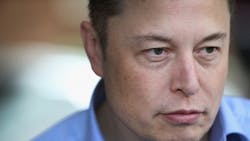Download Your Brain? Musk's New Startup Focuses on 'Neural Lacing'
Not content to reach for Mars and dethrone fossil fuels, tech entrepreneur Elon Musk on Tuesday is turning his focus to delving into people's minds.
In a message fired off Tuesday on Twitter, Musk appeared to confirm he is creating a startup called Neuralink devoted to enabling brains to interface directly with computers, accessing processing power and perhaps even downloading memories for storage.
"Long Neuralink piece coming out on (blog platform) @waitbutwhy in about a week. Difficult to dedicate the time, but existential risk is too high not to," Musk tweeted.
The Twitter post by the founder of electric carmaker Tesla and exploration firm SpaceX came a day after a Wall Street Journal report saying the company had been formed.
The Journal reported that the new startup will focus on "neural lace" technology which involves implanting tiny brain electrodes capable of uploading and downloading thoughts.
The report said Musk may play a "significant leadership role" even as he runs two other large companies.
Musk has previously spoken about the idea of neural lacing, claiming it can magnify people's brain power by linking them directly to computing capabilities.
Battling Evil
The risk that he referred to in his Twitter post was likely linked to his concern that artificial intelligence could become a threat to humans.
Musk not long ago found himself in the middle of a technology world controversy by holding firm that AI could turn on humanity and be its ruin instead of a salvation.
He took part in creating a nonprofit research company devoted to developing artificial intelligence that will help people and not hurt them.
Technology giants including Google, Apple and Microsoft have been investing in making machines smarter, contending the goal is to improve lives.
"If we create some digital super-intelligence that exceeds us in every way by a lot, it is very important that it be benign," Musk said last year at a conference in California.
He reasoned that even a benign situation with ultra-intelligent AI would put people so far beneath the machine they would be "like a house cat."
"I don't love the idea of being a house cat," Musk said, envisioning the creation of neural lacing that magnifies people's brain power by linking them directly to computing capabilities.
About the Author
Bloomberg
Licensed content from Bloomberg, copyright 2016.
